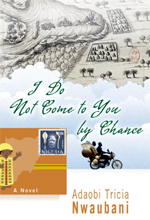A few years ago, I would never have considered
picking up a book simply because it had a Nigerian author or an
author of Nigerian heritage. Brilliant novels by talented (and frighteningly
young) women like Chimamanda Ngozi Adichie and Helen Oyeyemi have
changed my mind. So I had high expectations of this debut novel
about corruption and email scams, and I wasn’t disappointed.
Kingsley Ibe is a freshly minted engineering graduate
from a family that has highly prized education and despised those
who chase money instead of knowledge. He’s engaged to the
beautiful Oya, and confident that his brilliant results will get
him a good job in an oil firm so he can support his and her families.
Sadly, in modern Nigeria, it’s not what you
know but who (sound familiar?). Kingsley receives multiple
rejection letters, Oya loses faith in his ability to ever provide,
and a family crisis plunges the Ibe family from the edge of poverty
to its depths. Kingsley can either hold on to the principles that
stripped his parents of everything but their pride. Or he can turn
to his uncle Boniface, aka Cash Daddy – secondary school dropout
turned email scam billionaire – who is happy to help as long
as Kingsley uses his big brain to aid his nefarious schemes.
The theme of a good person tempted by circumstances
to do bad things is not a new one in literature, but author Nwaubani
makes it fresh by plunging the reader into a dizzying new world
of 419ers (scammers), mugus (victims), fake companies and real Armani. Her characters are fully fleshed
out and three-dimensional. Even the appalling Cash Daddy, who conducts
meetings with his minions when he’s on the toilet, is sublimely
entertaining. The scene where he impersonates a government minister
for an easily awed European mugu is priceless.
I Do Not Come To You By Chance is alternately
funny, tender, satirical and sad. Nwaubani’s observations
and her dialogue are sharp and laugh-out-loud funny, and the plot
is fast-paced. I can imagine this novel as a movie, though hopefully
not from Nollywood (the Nigerian movie industry is mercilessly skewered).
Kingsley is at times a terrible snob and a sellout, but likable
even when he’s sweet-talking naïve Americans out of their
life savings.
This is an eye-opening novel, whether about the
troubles of everyday Nigerians (hospitals where patients have to
buy their own bandages and IV fluids) or the mind-boggling lifestyle
of the 419ers. Lastly, if you’ve ever wanted to know what
kind of people actually answer those shonky “I am a Nigerian
billionaire but my bank accounts have been frozen” emails
– and what happens next – look no further than this
novel.
Another Nigerian literary triumph and one of my
favourite books for 2009. 
|

![African Writing Online [many literatures, one voice]](http://www.african-writing.com/eight/images/logo8.png)









![]()
![]()

